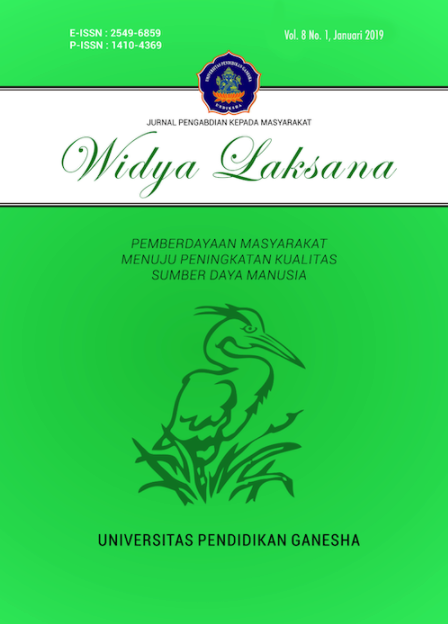Optimalisasi Peran Orang Tua Dalam Pemantauan Pertumbuhan, Perkembangan dan Stimulasi Balita pada Masa Pandemi Covid-19
DOI:
https://doi.org/10.23887/jwl.v11i2.45692Keywords:
Peran Orang Tua, Stimulasi, BalitaAbstract
Penyakit Coronavirus 2019 (COVID-19) merupakan masalah kesehatan dunia. Langkah-langkah yang dilakukan pemerintah untuk mengendalikan pandemi ini menimbulkan dampak yang luas pada perekonomian, kehidupan sehari-hari dan semua aspek kehidupan anak. Gangguan pertumbuhan dan perkembangan seringkali tidak kentara dan sulit untuk diketahui, biasanya akan terdeteksi ketika sudah terjadi masalah. Proses skrining awal memungkinkan untuk menemukan anak-anak berisiko mengalami masalah dalam perkembangan. Orang tua memiliki peran yang penting dalam melakukan kegiatan ini. Tujuan Kegiatan ini untuk meningkatkan kemampuan orang tua dalam memantau pertumbuhan, perkembangan, pemberian stimulasi pada balita dirumah dan tercatatnya hasil pemantauan pada buku Kesehatan Ibu Anak (KIA). Metode kegiatan pengabdian ini adalah pelatihan. Hasil dari pengabdian ini terdapat peningkatan pengetahuan pada orang tua balita mengenai pemantauan pertumbuhan dan perkempangan dilihat dari hasil pre dan posttest serta terlaksananya pemantauan pertumbuhan, perkembangan dan pemberian stimulasi pada balita dirumah.
References
Akombi, B. J. et al. (2017) ‘Stunting and severe stunting among children under-5 years in Nigeria: A multilevel analysis’, BMC Pediatrics, 17(1), pp. 1–16. doi: 10.1186/s12887-016-0770-z.
BPS Kabupaten Buleleng (2020) Kecamatan Sukasada Dalam Angka 2020. 1st edn. Edited by BPS Kabupaten Buleleng. Buleleng: BPS Kabupaten Buleleng.
Cucinotta, D. and Vanelli, M. (2020) ‘WHO declares COVID-19 a pandemic’, Acta Biomedica, 91(1), pp. 157–160. doi: 10.23750/abm.v91i1.9397.
de Onis, M. and Branca, F. (2016) ‘Childhood stunting: A global perspective’, Maternal and Child Nutrition, 12, pp. 12–26. doi: 10.1111/mcn.12231.
Dinas Kesehatan (2018) ‘Kabupaten Buleleng Tahun 2018’, Profil Kesehatan Kabupaten Buleleng, p. 10.
Dinas Kesehatan Provinsi Bali (2019) ‘Profil Kesehatan Provinsi Bali 2018’, Dinas Kesehatan Provinsi Bali, pp. 1–129. Available at: https://www.diskesbaliprov.go.id.
Ding, W. et al. (2021) ‘Knowledge, attitudes, practices, and influencing factors of anxiety among pregnant women in Wuhan during the outbreak of COVID-19: a cross-sectional study.’, BMC pregnancy and childbirth, 21(1), p. 80. doi: 10.1186/s12884-021-03561-7.
Febry, F. (2012) ‘Pemantauan Pertumbuhan Balita Di Posyandu Monitoring the Growth of Infants in Posyandu’, Juarnal Ilmu Kesehatan Masyarakat, 3(November 2012), pp. 166–171. Available at: https://media.neliti.com/media/publications/57920-ID-monitoring-the-growth-of-infants-in-posy.pdf.
Glascoe, F. P. (2000) ‘Early detection of developmental and behavioral problems.’, Pediatrics in review / American Academy of Pediatrics, 21(8). doi: 10.1542/pir.21-8-272.
Holil M. Par’i, Sugeng Wiyono, T. P. H. (2017) Penilaian Status Gizi. 1st edn. Jakarta: Kementerian Kesehatan Republik Indonesia.
Kania, N. (2006) ‘STIMULASI TUMBUH KEMBANG ANAK UNTUK MENCAPAI TUMBUH KEMBANG YANG OPTIMAL’, pp. 1–10.
Kementerian Kesehatan Republik Indonesia (2016) Profil Kesehatan Indonesia 2016, Profil Kesehatan Provinsi Bali. Available at: http://www.depkes.go.id/resources/download/pusdatin/profil-kesehatan-indonesia/Profil-Kesehatan-Indonesia-2016.pdf.
Kementrian Kesehatan RI (2012) Pedoman Pelaksanaan Stimulasi, Deteksi dan Intervensi Dini Tumbuh Kembang Anak di Tingkat Pelayanan Kesehatan Dasar. Jakarta.
Kementrian Kesehatan RI (2020) ‘Kesehatan Balita Pada Masa Tanggap Darurat COVID-19’, Kementrian Kesehatan RI, pp. 1–30.
Kotlar, B. et al. (2021) The impact of the COVID-19 pandemic on maternal and perinatal health: a scoping review, Reproductive Health. BioMed Central. doi: 10.1186/s12978-021-01070-6.
Kyerematen, V. et al. (2014) ‘Exploratory application of the Ages and Stages (ASQ) child development screening test in a low-income Peruvian shantytown population’, BMJ Open, 4(1), pp. 4–7. doi: 10.1136/bmjopen-2013-004132.
Lutfiya, I., Irwanto and Purnomo, W. (2019) ‘Identification validity early detection of child development using Indonesian mch handbook’, Indian Journal of Public Health Research and Development, 10(8), pp. 1819–1824. doi: 10.5958/0976-5506.2019.02113.2.
Mahmudiono, T., Sumarmi, S. and Rosenkranz, R. R. (2017) ‘Household dietary diversity and child stunting in East Java, Indonesia’, Asia Pacific Journal of Clinical Nutrition, 26(2), pp. 317–325. doi: 10.6133/apjcn.012016.01.
Masjoudi, M. et al. (2020) ‘Explaining the experience of prenatal care and investigating the association between psychological factors with self-care in pregnant women during COVID-19 pandemic: A mixed method study protocol’, Reproductive Health, 17(1), pp. 1–7. doi: 10.1186/s12978-020-00949-0.
Muhaidat, N. et al. (2020) ‘Pregnancy during COVID-19 outbreak: The impact of lockdown in a middle-income country on antenatal healthcare and wellbeing’, International Journal of Women’s Health, 12, pp. 1065–1073. doi: 10.2147/IJWH.S280342.
Permenkes No.66 (2014) ‘Pemantauan Pertumbuhan, Perkembangan, dan Gangguan Tumbuh Kembang Anak’, Berita Negara Republik Indonesia Tahun 2014 Nomor 1524, p. 15.
Riskesdas, K. (2018) ‘Hasil Utama Riset Kesehata Dasar (RISKESDAS)’, Journal of Physics A: Mathematical and Theoretical, 44(8), pp. 1–200. doi: 10.1088/1751-8113/44/8/085201.
Sari, T. P. and Haryanti, R. S. (2019) ‘The Effect of Stimulation, Detection, and Early Intervention Development Training Based on Group Dynamics on Motivation and Skill among Cadre’, Journal of Maternal and Child Health, 4(5), pp. 341–347. doi: 10.26911/thejmch.2019.04.05.08.
Supariasa, I. D. N. and Purwaningsih, H. (2019) ‘Faktor-Faktor Yang Mempengaruhi Kejadian Stunting Pada Balita Di Kabupaten Malang’, Karta Rahardja, 1(2), pp. 55–64. Available at: http://ejurnal.malangkab.go.id/index.php/kr.
Syofiah, P. N., Machmud, R. and Yantri, E. (2019) ‘Analisis Intervensi Pelaksanaan Dini Program Deteksi Balita dan di Tumbuh Kembang ( SDIDTK ) Puskesmas Kota Padang Tahun 2018’, 8(4), pp. 151–156.
United Nations Children’s Fund (2020) ‘COVID-19 and Children in Indonesia: An agenda for action to address socio-economic challenges’, Unicef, (May).
WHO (2012) ‘65th World Health Assembly. Prevention and control of non-communicable diseases.’, Resolutions and decisions, (May), pp. 45–46. Available at: http://apps.who.int/gb/ebwha/pdf_files/WHA65-REC1/A65_REC1-en.pdf#page=65.
Downloads
Published
Issue
Section
License
Authors who publish with the Widya Laksana agree to the following terms:- Authors retain copyright and grant the journal the right of first publication with the work simultaneously licensed under a Creative Commons Attribution License (CC BY-SA 4.0) that allows others to share the work with an acknowledgment of the work's authorship and initial publication in this journal
- Authors are able to enter into separate, additional contractual arrangements for the non-exclusive distribution of the journal's published version of the work (e.g., post it to an institutional repository or publish it in a book), with an acknowledgment of its initial publication in this journal.
- Authors are permitted and encouraged to post their work online (e.g., in institutional repositories or on their website) prior to and during the submission process, as it can lead to productive exchanges, as well as earlier and greater citation of published work. (See The Effect of Open Access)



